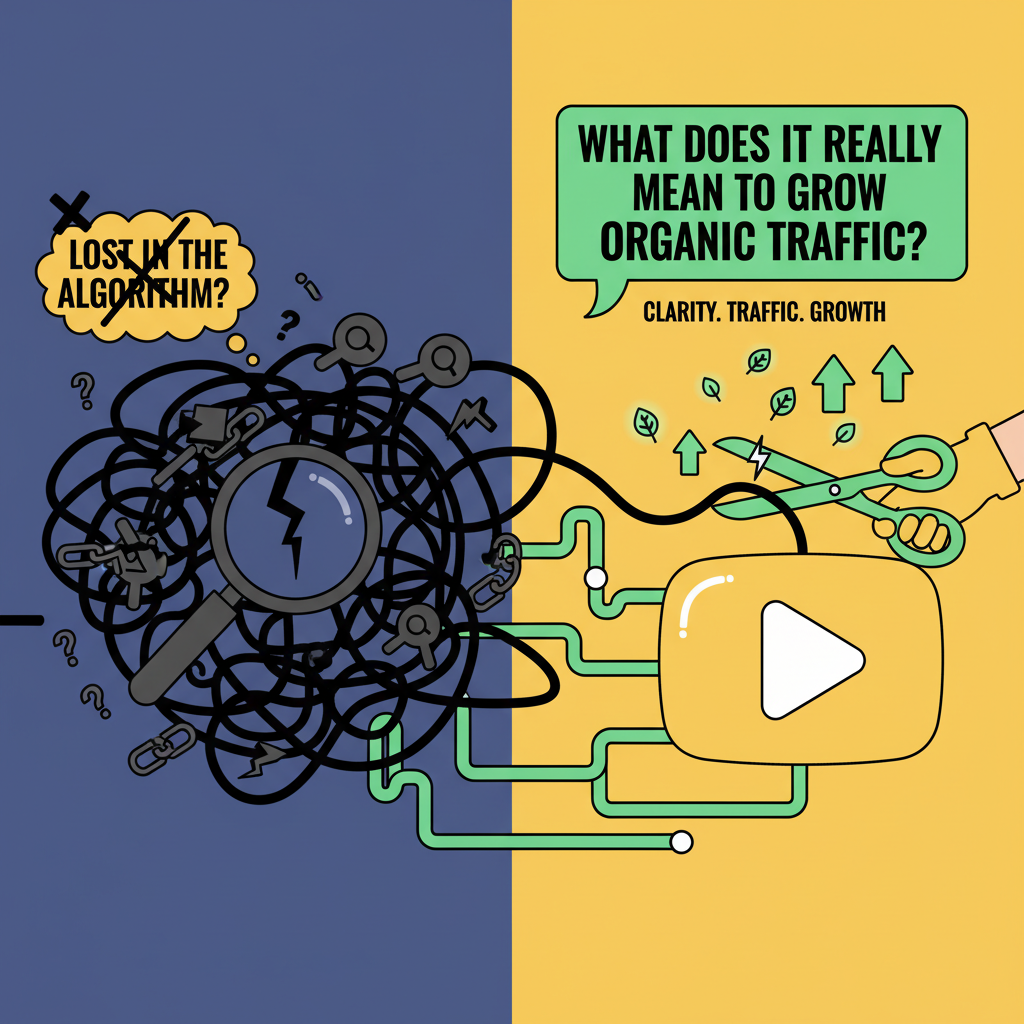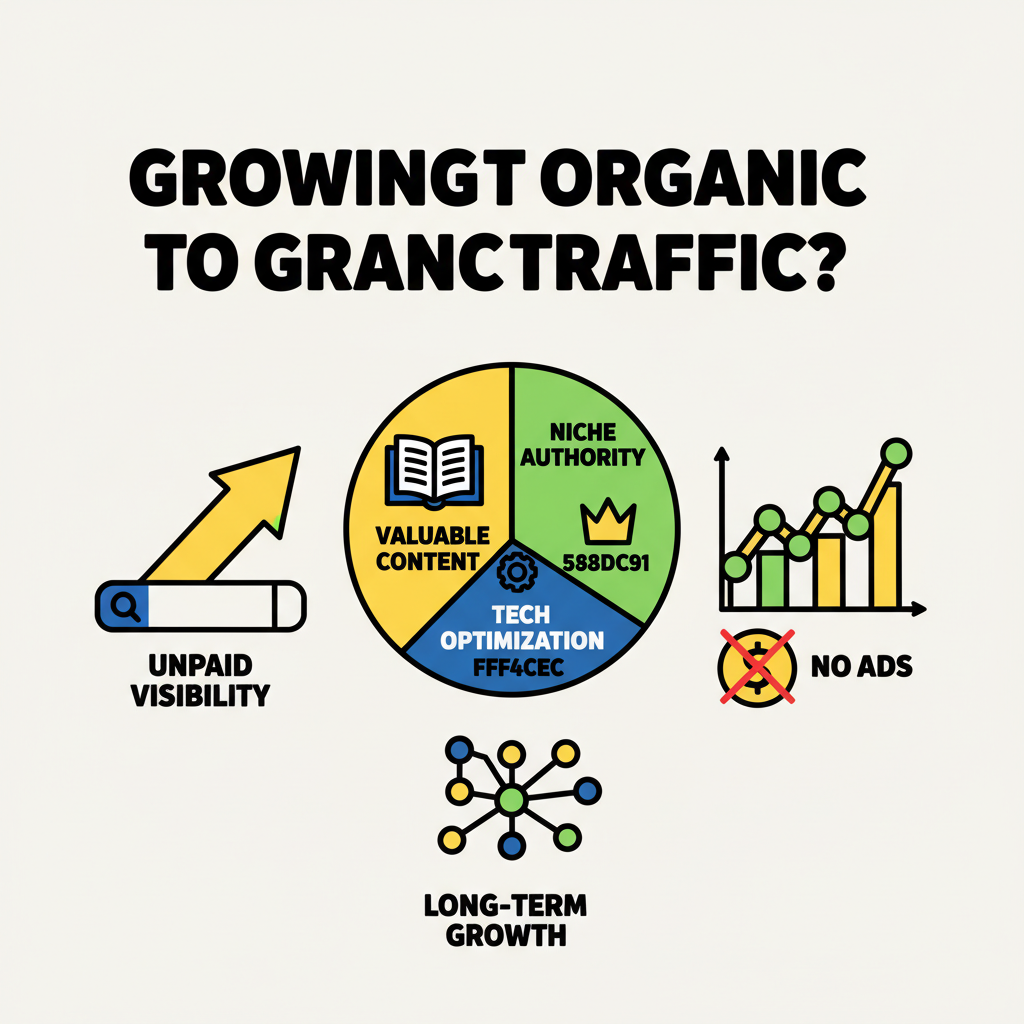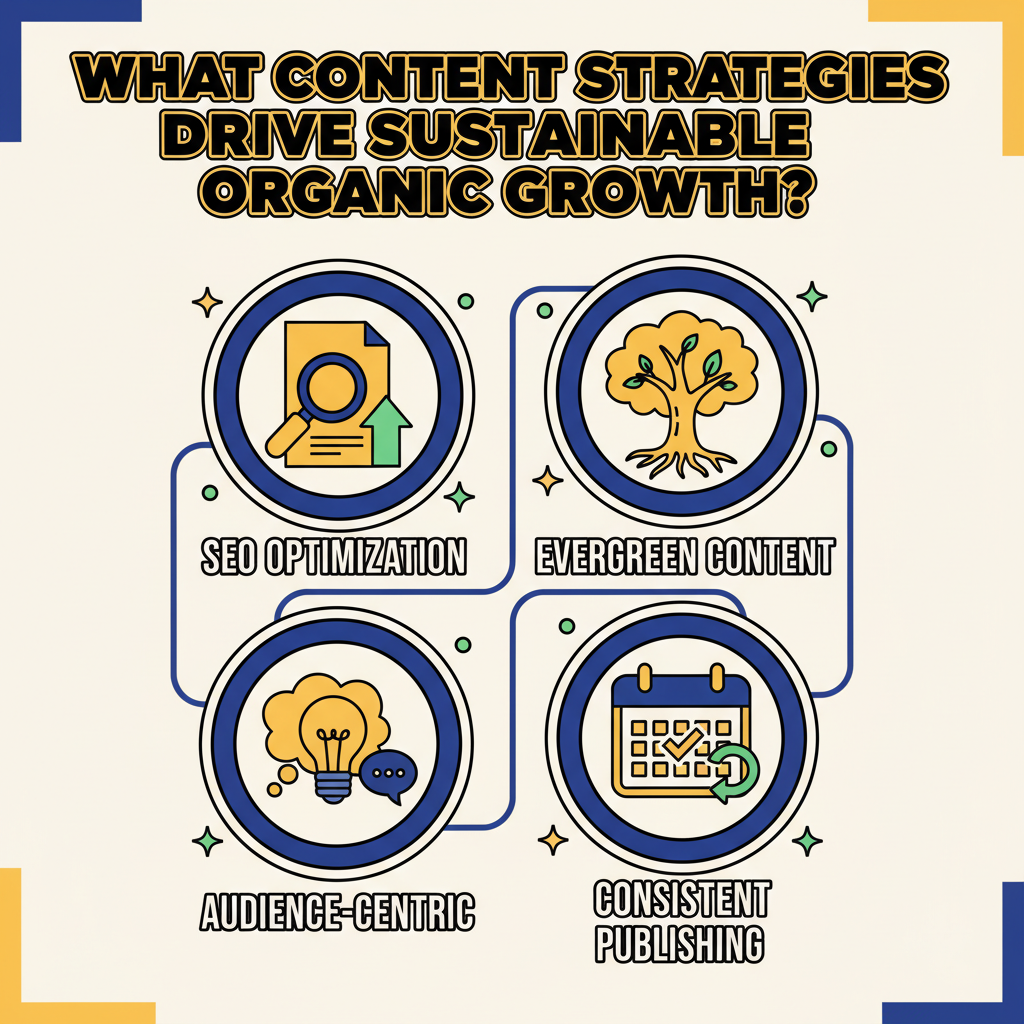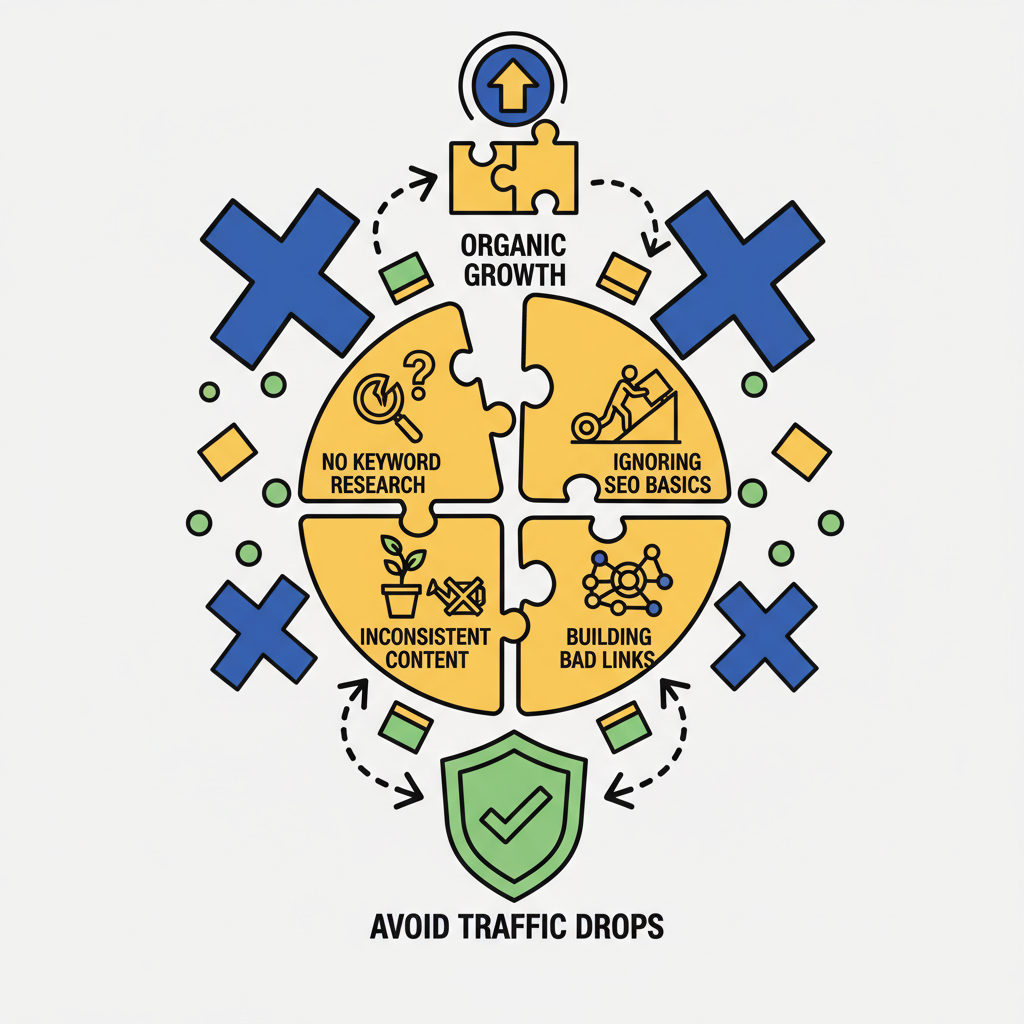What Does It Really Mean to Grow Organic Traffic?
Posted by
Related reading
What Does SEO Automated Actually Mean?
How to Implement SEO Automated Solutions That Actually Drive Results Implementing automated SEO can transform your digital marketing strategy, but only when don...
The Complete Guide to Building a Successful Blog Post Website in 2026
The Complete Guide to Building a Successful Blog Post Website in 2026 Creating a blog post website has become one of the most powerful ways to establish an onli...
What Exactly Is Keyword Research in SEO?
What Makes Keyword Research in SEO Different from General Keyword Research? When most people think about keyword research, they picture brainstorming popular se...
How to Grow Organic Traffic: A Complete Step-by-Step Strategy Guide

Building sustainable organic traffic is the holy grail of digital marketing, but many website owners struggle to create a systematic approach that delivers consistent results. Growing organic visibility requires more than just publishing content and hoping for the best. It demands a strategic methodology that combines technical optimization, content excellence, and user experience improvements to attract visitors who are genuinely interested in what you offer.
This comprehensive guide will walk you through proven strategies to grow organic traffic sustainably, helping you build a foundation that generates long-term results for your business. Whether you're starting from scratch or looking to amplify existing efforts, these actionable steps will transform your approach to organic growth.
What Does It Really Mean to Grow Organic Traffic?

Growing organic traffic means increasing the number of visitors who find your website through unpaid search engine results. Unlike paid advertising, organic growth focuses on earning visibility through valuable content, technical optimization, and building authority in your niche.
The beauty of organic traffic lies in its sustainability and quality. When you successfully grow organic visibility, you attract users who are actively searching for solutions you provide, resulting in higher engagement rates and better conversion potential. This approach builds compound value over time, where each piece of optimized content continues working for months or years after publication.
Understanding the difference between organic growth and other traffic sources helps you allocate resources effectively. While social media and paid ads can provide quick bursts of visitors, organic search delivers consistent, targeted traffic that grows stronger with time and effort.
How Do You Build the Foundation for Organic Growth?
Start with Comprehensive Keyword Research
The foundation of any successful organic growth strategy begins with understanding what your audience searches for. Effective keyword research and strategic planning reveals opportunities where you can compete effectively while serving genuine user needs.
Focus on identifying a mix of high-volume competitive terms and long-tail keywords with lower competition but high intent. Tools like Google Keyword Planner, SEMrush, and Ahrefs provide valuable insights into search volumes, competition levels, and related terms that can expand your content opportunities.
Document your keyword findings in a strategic content calendar that maps topics to user intent. This systematic approach ensures every piece of content serves a specific purpose in your organic growth strategy while avoiding keyword cannibalization between pages.
Optimize Your Technical SEO Foundation
Technical SEO creates the infrastructure that search engines need to discover, crawl, and index your content effectively. Without solid technical foundations, even the best content struggles to achieve organic visibility.
Start by ensuring your website loads quickly across all devices. According to Google's Core Web Vitals research, page speed directly impacts both user experience and search rankings. Compress images, minimize code, and leverage browser caching to improve performance.
Create a logical site structure with clear navigation and internal linking patterns. This helps search engines understand your content hierarchy while making it easier for users to find relevant information. Implement proper schema markup to help search engines better understand your content context and display rich snippets in search results.
What Content Strategies Drive Sustainable Organic Growth?

Create Intent-Focused Content That Serves Real Needs
Successful organic growth depends on creating content that genuinely helps your audience solve problems or achieve goals. Understanding intent-based content creation allows you to develop resources that naturally attract and engage your target market.
Map your content to different stages of the buyer journey, from awareness-stage educational pieces to decision-stage comparison guides. This comprehensive approach captures organic traffic at every point in the customer lifecycle, maximizing your growth potential.
Focus on creating comprehensive resources that become the definitive answer to specific questions in your niche. These pillar pieces attract backlinks naturally and establish your authority, contributing significantly to long-term organic growth.
Develop a Consistent Publishing Schedule
Consistency plays a crucial role in growing organic traffic over time. Search engines favor websites that regularly publish fresh, valuable content, and users return to sources they can rely on for ongoing insights.
Regular blog posting and content creation signals to search engines that your website remains active and relevant. However, quality always trumps quantity. It's better to publish one exceptional piece weekly than multiple mediocre posts that don't serve user needs effectively.Create an editorial calendar that balances different content types and topics while maintaining your publishing rhythm. This strategic approach ensures you cover important keywords systematically while avoiding content gaps that could slow your organic growth momentum.
How Can You Accelerate Your Organic Growth Results?
Leverage Data-Driven Optimization
Growing organic traffic requires continuous monitoring and optimization based on actual performance data. Google Analytics and Search Console provide essential insights into which strategies drive results and where improvements are needed.
Track key metrics including organic sessions, average session duration, bounce rate, and conversion rates from organic traffic. These indicators reveal not just how much traffic you're attracting, but how well that traffic aligns with your business goals.
Use this data to identify your highest-performing content and understand what makes it successful. Then apply those insights to optimize underperforming pages and inform your future content strategy for accelerated organic growth.
| Organic Growth Metric | What It Measures | Why It Matters | Target Range |
|---|---|---|---|
| Organic Sessions | Total visitors from search | Overall growth progress | 20%+ monthly increase |
| Average Session Duration | Time spent on site | Content quality and relevance | 2-4 minutes |
| Pages per Session | Content engagement depth | Site structure effectiveness | 2-3 pages |
| Organic Conversion Rate | Goal completions from organic traffic | Traffic quality and business impact | 2-5% depending on industry |
Build Authority Through Strategic Link Building
High-quality backlinks remain one of the strongest ranking factors for organic growth. However, effective link building focuses on earning links through valuable content and genuine relationships rather than manipulative tactics.
Create linkable assets like original research, comprehensive guides, or useful tools that naturally attract references from other websites. According to Moz's link building research, content that provides unique value or insights generates the most sustainable backlink growth.
Develop relationships with other professionals in your industry through genuine engagement and collaboration. Guest posting, podcast appearances, and joint content projects can generate high-quality backlinks while expanding your audience reach.
What Common Mistakes Should You Avoid When Growing Organic Traffic?

Don't Sacrifice Quality for Quantity
Many website owners make the mistake of focusing solely on publishing volume rather than content quality when trying to grow organic traffic. This approach often backfires because search engines prioritize user satisfaction over content quantity.
Instead of publishing daily low-quality posts, invest time in creating fewer pieces that thoroughly address user needs and provide genuine value. One comprehensive guide that ranks well and attracts backlinks contributes more to organic growth than ten superficial articles that nobody reads or shares.
Focus on understanding your audience's real challenges and creating content that provides actionable solutions. This user-first approach aligns with search engine goals and drives sustainable organic growth over time.
Avoid Keyword Stuffing and Over-Optimization
While keywords remain important for organic growth, over-optimization can actually harm your rankings and user experience. Modern search engines understand content context and semantic relationships, making exact keyword matching less critical than comprehensive topic coverage.
Write naturally for your audience first, then optimize strategically by including relevant keywords in titles, headings, and throughout the content where they fit naturally. This balanced approach satisfies both search engines and users while avoiding penalties for over-optimization.
Remember that growing organic traffic depends more on providing value than gaming search algorithms. Focus on solving user problems, and the rankings will follow naturally.
How Do You Measure and Scale Your Organic Growth Success?
Track the Right Metrics for Long-Term Growth
Measuring organic growth requires looking beyond vanity metrics to focus on indicators that reflect real business impact. While total organic traffic provides a useful overview, deeper metrics reveal the quality and sustainability of your growth efforts.
Monitor your organic traffic growth rate month-over-month and year-over-year to identify trends and seasonal patterns. Track which pages drive the most organic traffic and analyze what makes them successful, then apply those insights to optimize other content.
Pay attention to your organic traffic's conversion rates and revenue attribution. Growing organic traffic that doesn't convert into leads or sales indicates a mismatch between your content and business objectives that needs addressing.
Scale Successfully Without Losing Quality
As your organic growth strategy succeeds, you'll face the challenge of scaling content production while maintaining quality standards. This is where systematic processes and potentially automated SEO solutions can help maintain consistency.
Develop content templates and editorial guidelines that ensure every piece meets your quality standards regardless of who creates it. Create detailed briefs that specify target keywords, user intent, and required elements for each content piece.
Consider building a team of specialized contributors rather than trying to handle everything yourself. Editors, researchers, and subject matter experts can help you scale content production while maintaining the quality that drives sustainable organic growth.
Conclusion
Growing organic traffic requires patience, strategy, and consistent execution, but the long-term benefits make this investment worthwhile for any serious business. By focusing on user needs, maintaining technical excellence, and creating genuinely valuable content, you can build sustainable organic growth that compounds over time.
The key to success lies in treating organic growth as a long-term strategy rather than a quick fix. Every piece of optimized content, every technical improvement, and every relationship you build contributes to a stronger foundation that supports continued growth.
Ready to implement these strategies and grow your organic traffic systematically? Fast SEO Fix provides the tools and expertise to accelerate your organic growth while maintaining the quality standards that drive sustainable results.

Stefan Winter
Founder & SEO Expert
Founder of Fast SEO Fix and SEO automation expert. Stefan built Fast SEO Fix to solve the tedious problem of manual SEO work. He specializes in SEO optimized content generation, keyword research, and automated SEO strategies.